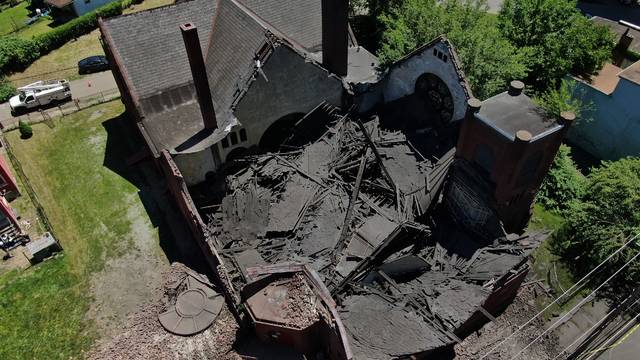Andrew Goddard has written an article comparing the current state of the Church of England to a “game of episcopal Jenga”. He sees what is already, “a rather precarious tower of Jenga bricks” due to “falling attendance, giving, and vocations, a massive trust deficit, multiple safeguarding failures” as further imperilled by “the [Living in Love and Faith (LLF)] story” in which bishops are “pushing with varying degrees of force at eight Jenga bricks, essential structural elements within the Church of England’s identity and crucial for its cohesion, stability, and unity”.
The “eight bricks” are “standalone services”, departure from the “doctrine” of marriage, “the church’s understanding of holy orders”, if clergy can enter into same-sex marriages, a reduction in “episcopal collegiality”, “pastoral reassurance”, disregard of “due process”, “the lack of a strong consensus” and “Scripture’s authority”.
Apparently, “The question the image of episcopal Jenga raises, however, is how anyone can seriously think it wise for the bishops to continue pushing and pulling at each of these major Jenga bricks that contribute to Anglican identity and unity, or believe that doing so can lead to any other outcome than a similar ‘great fall’ [to that is Matt 7:24-29] for the Church of England and the wider Anglican Communion.”
It is always a struggle to make a discussion of such a subject, especially if done at some length, interesting without a ‘hook’, or analogy, and all analogies, by definition, break down at some stage. But in this instance it seems that the analogy fundamentally does not work because ultimately it points to an entirely different conclusion to the one drawn.
To anyone who plays Jenga, it is immediately obvious that the “bricks” described are not like Jenga blocks at all. Jenga blocks are all but identical, which is intrinsic to how the game works, whilst challenges to ‘episcopal collegiality’ are relatively trivial compared to purporting to change the doctrine of the church catholic.
Most of all, the brick called ‘Scripture’s authority’ is not only relatively different to the others it is positionally different too. No player who wants to win a game of Jenga starts by removing all the lowest pieces and, significantly the article acknowledges this,
“Much opposition to the changes is based ultimately on the conviction that they can only be viewed as pushing away the foundational brick of the teaching of the apostles and prophets.”
This, of course, draws on Ephesians 2:20-21, “…built on the foundation of the apostles and prophets, Christ Jesus himself being the cornerstone, in whom the whole structure, being joined together, grows into a holy temple in the Lord”, but it does not do so sufficiently.
Unless the error of treating Scripture, tradition and reason as equal is engaged (which Revd Dr Goddard would not do) the Word written and flesh is not a brick, perhaps one of three as in Jenga, but the foundation without which, not only does the tower collapse, but there is no tower of the church at all.
It is decidedly not a question of what is crucial for the Church of England’s “cohesion, stability, and unity” but for whether it can continue to exists as a true Christian church at all.
The Church of England, as defined by its bishops, will not collapse because the majority of them do not believe that Scripture is the absolute and indispensable foundation of the Church, or even particularly relevant. Just as a Jenga tower can remain upright on just two, or even one, block, too many bishops are content if the Church stands on the, albeit unstable footings of reason and tradition, or even just one of them. No appeal to the ‘existence’ of Canon A5 is going to change that.
To make the point a slightly different way; before the game starts, the Jenga tower of bricks is encased in a transparent plastic sleeve which shapes the tower and holds it up such that the pulling and pushing at blocks can only begin once it is removed. The Church of England is less like an ongoing game of Jenga than one still encased in its plastic sleeve. Few could really argue that the 21st century CofE is genuinely held-up, shaped and defined by the foundation of Scripture described by St Paul, rather it is held up by other things – often things much less readily seen.
The transparent sleeve of the Church of England is the institution – that is what protects it, shapes it and defines it. It is the combination of structures, establishment, history, money, administration, hierarchy, roles and so on, all themselves entwined with reason and/or tradition that ensures its survival, not, however precious they may be individually, the pieces in it. This is in fact obvious – the church buildings could be empty of worshippers, the Bible entirely ditched and all parish clergy redundant, but something called ‘the Church of England’ would endure. It would have bishops and some social role, it would manage historic buildings, expend the financial legacy of generations of faithful givers, spend its time on various trending causes, expend the financial legacy of generations of faithful givers and be (an ever more irrelevant) part of the fabric of the nation.
The Church of England is not in danger of any type of collapse, except into apostasy. When it is accepted that the foundation is no longer there, or is in great danger of being fatally undermined, there is no purpose to be served in trying to preserve the tower or worrying about a block here or a block there.
In such circumstances, as already emphasised, there is no authentic tower at all and the only answer is to abandon the previous edifice to its spiritual collapse, but wobbly and largely pointless survival. That is to say, to turn all attention and efforts to a tower that is built on the sure foundation and loves being so.
This is again, where the Goddard piece is misguided. Contrary to what he suggests, the global communion is not imperilled by the collapse of the tower of the Church of England, rather, it is largely impervious to it, as has been proved by Gafcon and the Global South Fellowship of Anglicans
As far as England is concerned everything described in Andrew Goddard’s article points not to wasting more time and treasure on the impossible task of trying to stabilise a tower without foundations, but away from it and to the better tower which is the one provided and fashioned by Gafcon – the Anglican Network in Europe.



